|
67 Castle Street
Canterbury
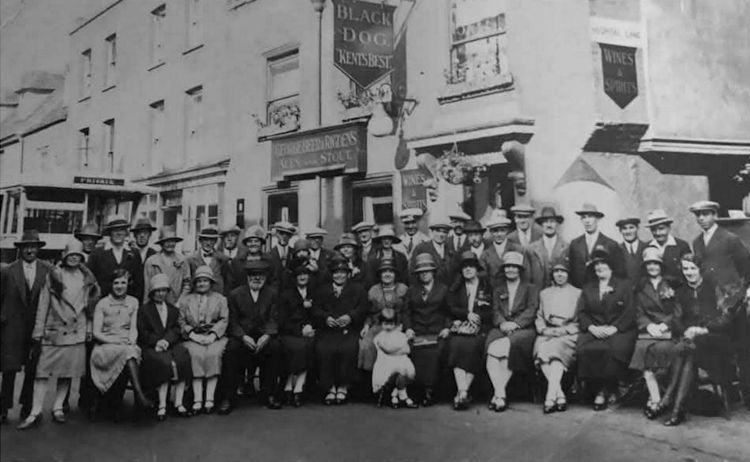
Group outing 1920s. Names unknown. |
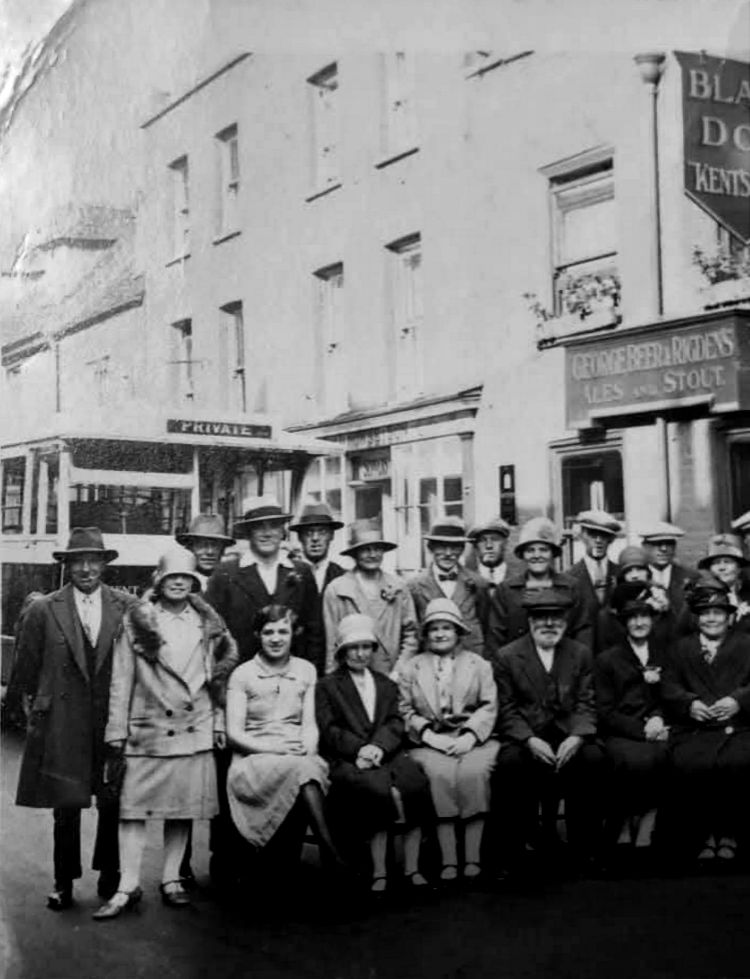
Close up of group 1920s. |
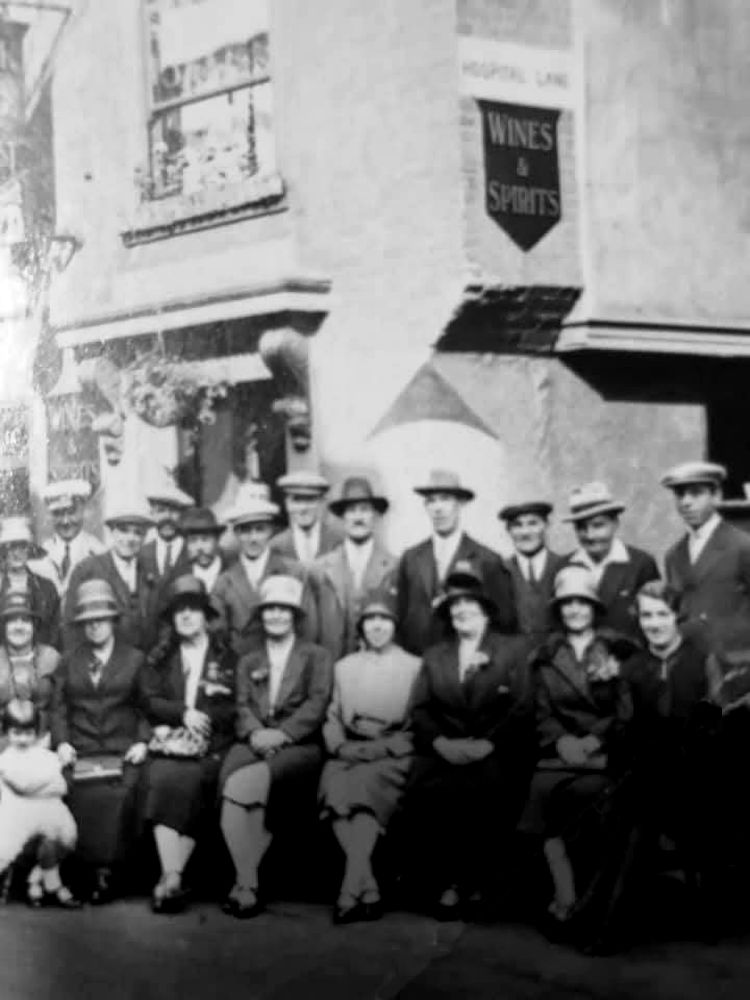
Close up of group 1920s. |
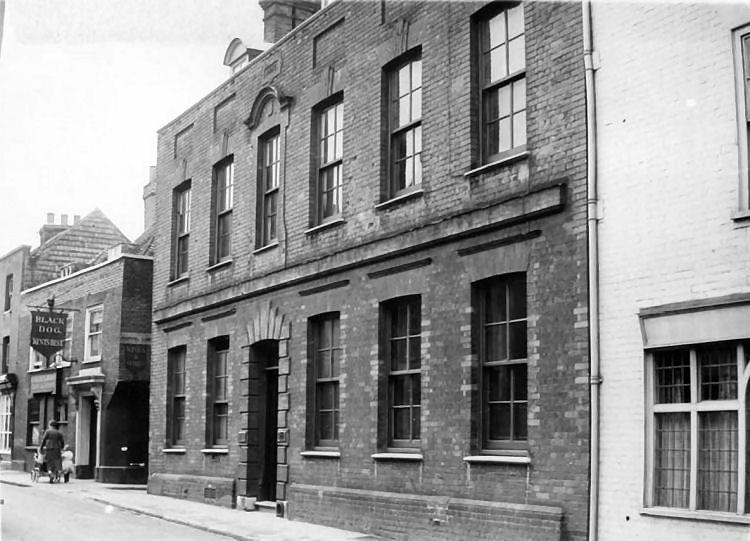
Above photo, circa 1941, kindly sent my Tim Timson. |
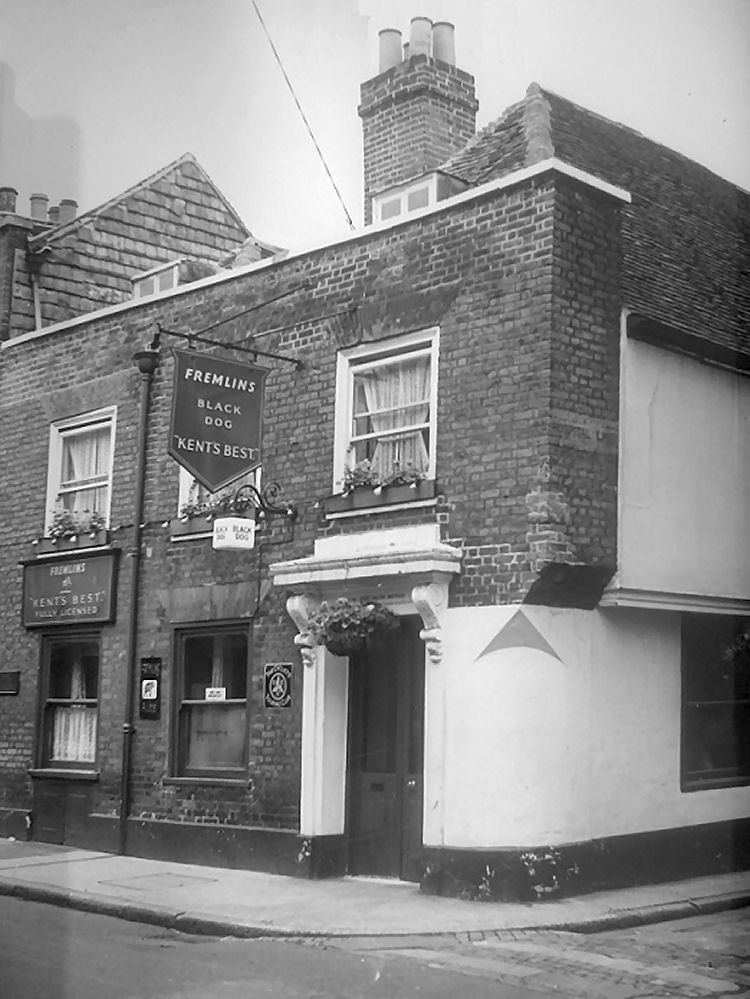
Above photo circa 1952, kindly sent by Rory Kehoe. |
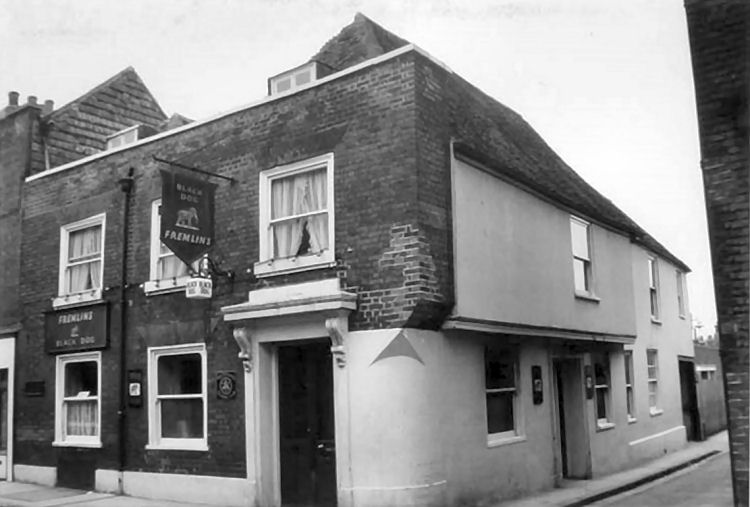
Above photo, circa 1961, kindly sent my Tim Timson. |
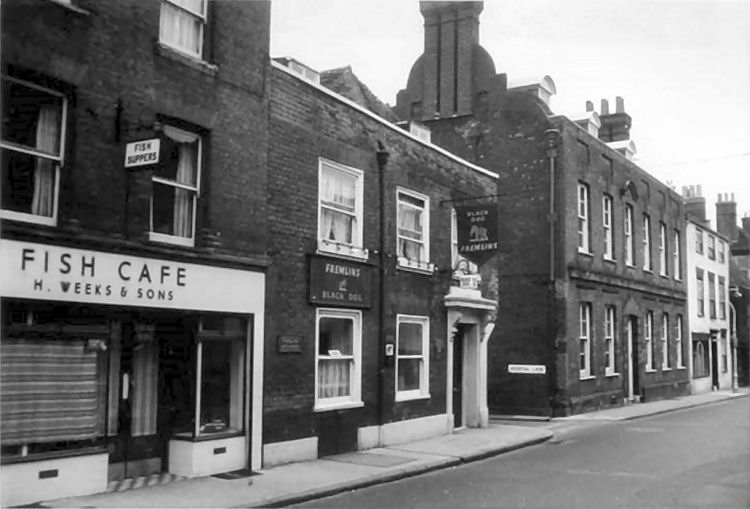
Above photo, circa 1961, kindly sent my Tim Timson. |
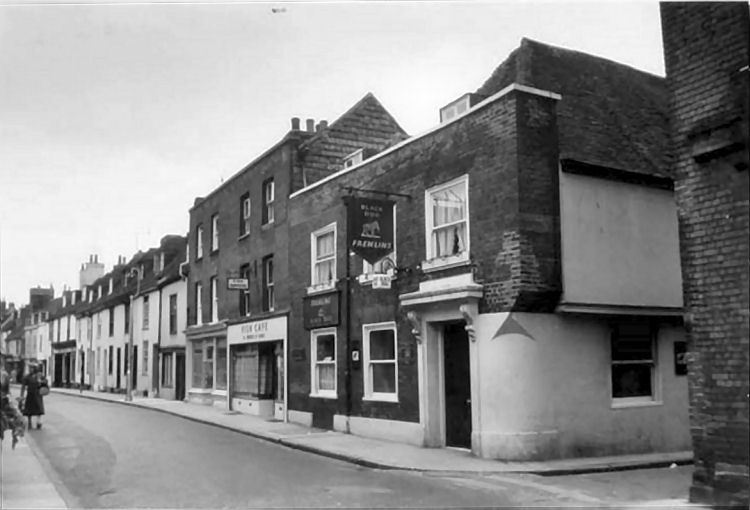
Above photo, circa 1961, kindly sent my Tim Timson. |
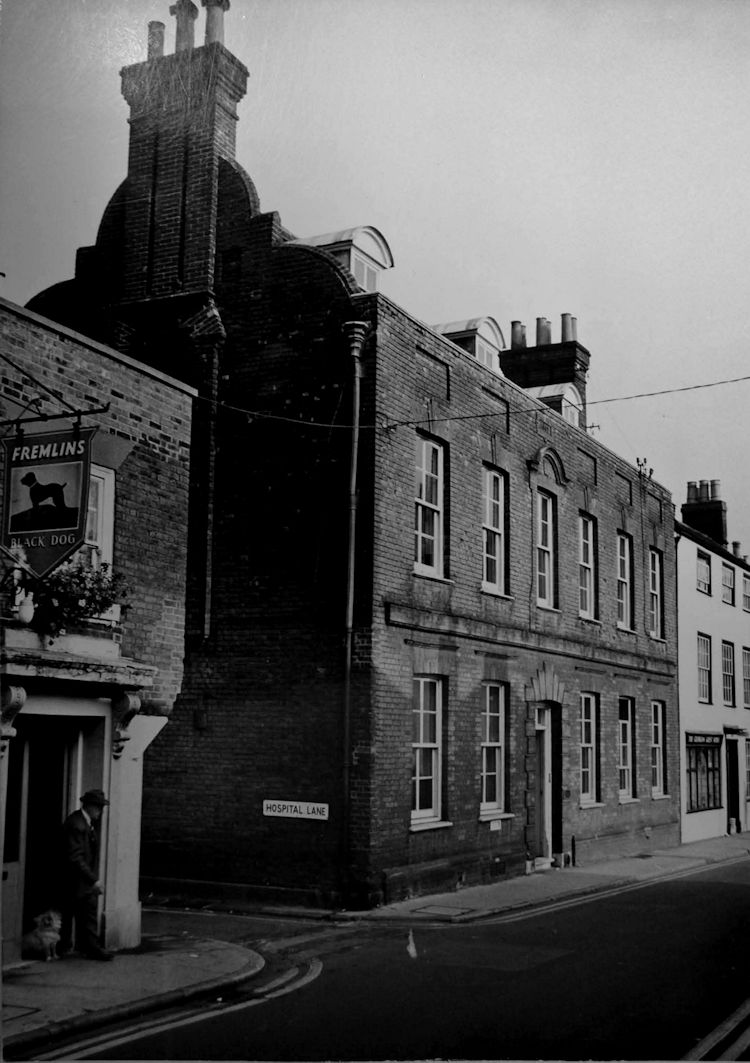
Above photo, date unknown. |
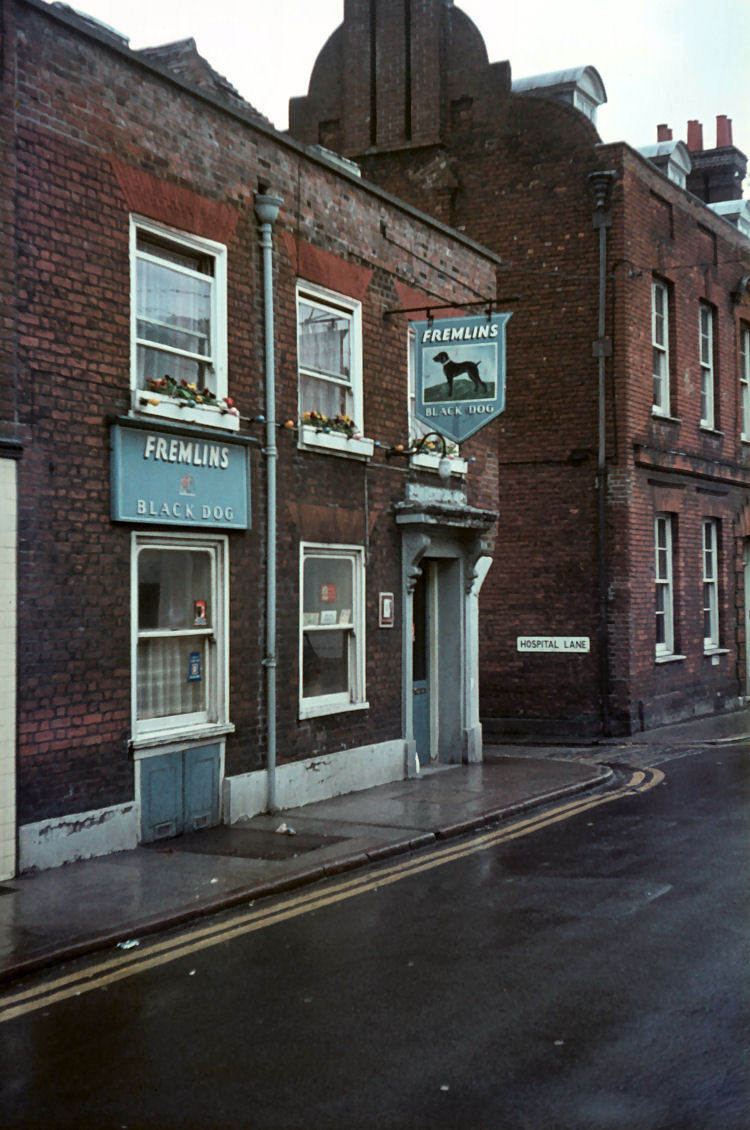
Above photograph copyright Jan Fraters. |
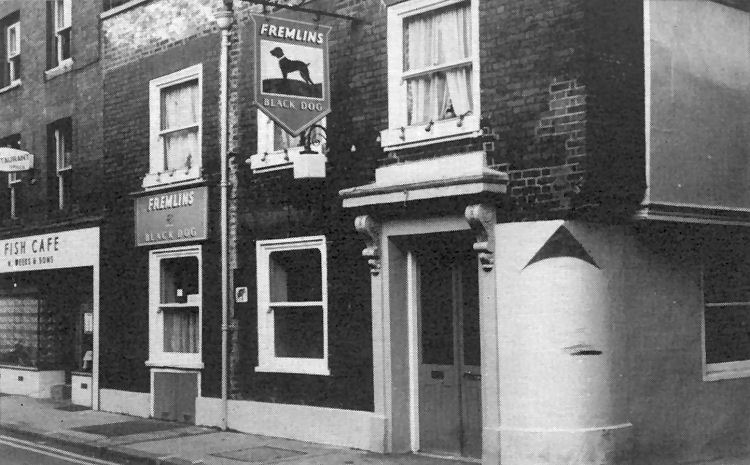
Above showing the "Black Dog" in 1965. Photo by Edward Wilmot.
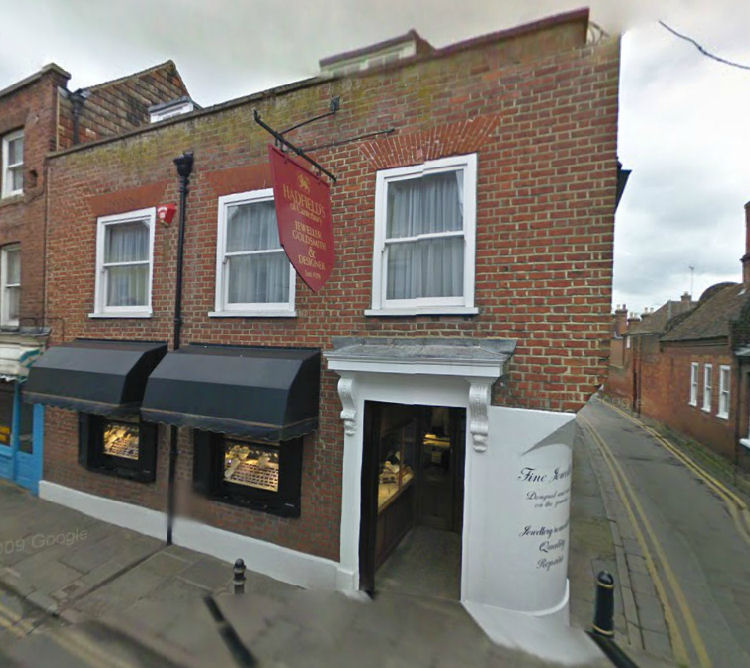
Above picture taken from Google March 2009. |
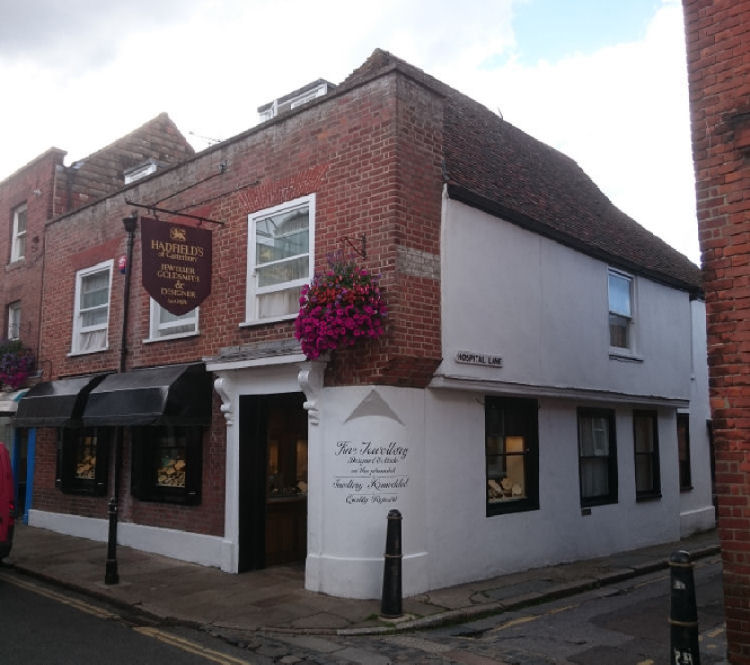
Above photo, August 2017, kindly sent by Rory Kehoe. |
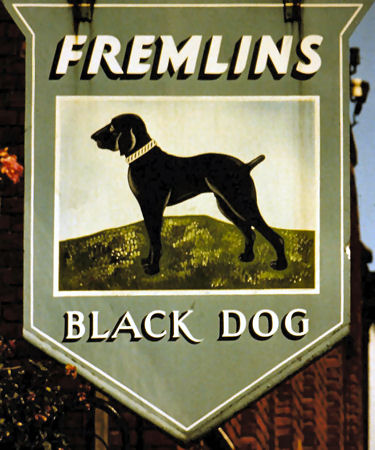
Above sign 1965.
With thanks from Brian Curtis
www.innsignsociety.com. |
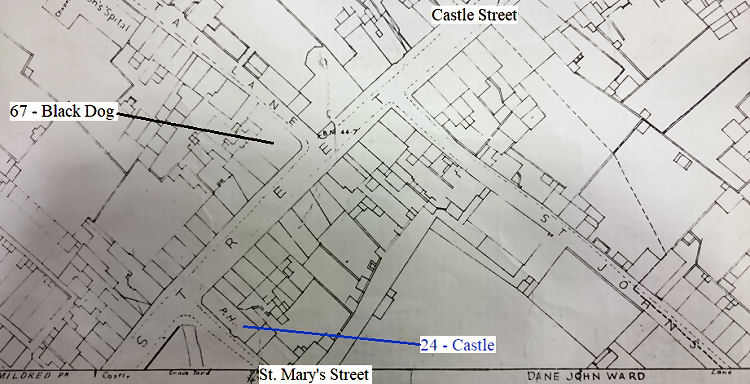
Above map 1874 identified by Rory Kehoe. |
The Canterbury Historical Association booklet on Castle Street
says the Black Dog is an early 16th century building.
Found in a list of 1692 when it was referred to merely as the "Dog." The
following year it was on the Billeting list for 4 men.
The pub was definitely known as the "Black Dog" in 1803 when it was
listed in a Kent Directory, and Land Tax was being paid at this address in
1826. The premises eventually gained its full license and operated as a
hotel in 1939 boasting three bedrooms and other attic rooms.
An entry in Fremlin's 1950s publication called "Where shall we go,"
indicated the following:- Phone number - Canterbury 2994. Parking
accommodation - Car park 1 minute. Lunch - Snacks at Bar. Tea - Snacks at
Bar. Remarks - Fine Old Inn.
Unfortunately closed in 1976 to become Hadfield's the Jewellery Shop.
Whilst this shop was being renovated, some bones were found underneath some
upstairs floorboards, but were later found to be mutton bones, probably
hidden by some hungry servants.
|
Kent Gazette Reports 18 January 1805.
DIED.
Yesterday died, Mrs. Street, wife of Mr. W. Street, landlord of the
"Black Dog" public-house, Castle-street.
|
|
Kentish Gazette, Tuesday 28 April 1807.
April 27th, 1807.
To the Freeman of the City of Canterbury.
At a numerous Body of Freeman assembled at the "Black Dog," Castle
Street, it was unanimously resolved to give support to Independent
Gentleman, willing to come forward to support the rights and
franchises of the Freeman, who have so lately been transferred and
disposed of at the will of others.
Resolved secondly, that this meeting to adjourn until Thursday, 30th
of April, to be then held, at the "Fleece Inn," Canterbury.
Wilkes, Chairman.
|
|
Kentish Weekly Post or Canterbury Journal, Tuesday 24 October 1809.
Married. October 21, Mr. Street, landlord of the "Black Dog" public
house, Castle Street, Canterbury, to Mrs. Amos.
|
|
Kentish Gazette 23 February 1810.
DIED.
Feb. 13, Mrs Susan Tevelein, widow of Mr. John Tevelein, formerly of the
"Black Dog," public-house, Castle-street, Canterbury.
|
|
Kentish Weekly Post or Canterbury Journal 03 April 1812.
DIED.
April 2, the infant daughter of Mr. Street, landlord of the "Black Dog,"
Castle-street, Canterbury.
|
|
From the Kentish Gazette, 26 November 1839.
DEATH.
Nov. 20, aged 78, Mr. Street, for 40 years landlord of the "Black Dog,",
Castle Street, Canterbury. He had just returned, apparently in good
health, from carrying out beer, when he sat down in the tap-room and
instantly expired without a groan.
|
|
Kentish Gazette 10 March 1840.
CANTERBURY.
A £20 Burial Society has been established at the "Black Dog,"
Castle-street, in this city. The first meeting took place on Tuesday
evening, when a committee was appointed, and upwards of fifty persons
were enrolled as members.
|
|
Maidstone Journal and Kentish Advertiser, Tuesday 12 June 1849.
Canterbury.
Important sale of the extensive Brewery of Messr's Flint, including 30
old established Inns and Public Houses, and other valuable property.
Mr. V. J., has received instructions to sell by auction, at the
"Fountain Hotel," Canterbury, on Tuesday and Wednesday, 26th and 27th of
June, at 12 o'clock each day, (in consequence of the death of the senior
acting partner and the retirement of the surviving partners,) the
valuable property known as Messrs. Flint's Brewery, in Stour Street,
Canterbury, and the Inns, Public Houses, and other valuable property
connected with theirwith. The first day sale on Tuesday, 26th June,
1849, will comprise the following property in and near the city.
Public houses.
Lot 1. The "City of Canterbury," situate on the road to Whitstable.
Freehold.
Lot 2. The "George and Dragon," Westgate without, leasehold under Hind's
charity for 17 years unexpired.
Lot 3. The "Three Compasses," Westgate
within. Freehold.
Lot 4. The "Bell Inn" and Coach Office, in the High Street. Freehold.
Lot 5. The "Prince of Wales," St. Alphege Lane,. Freehold.
Lot 6. The "Weavers Arms," Broad Street, freehold and partly leasehold.
Lot 7. The "White Swan," Northgate. Leasehold under St. John's Hospital
for a short term, at a ground rent.
Lot 8. The "Kings Head," Northgate.
Freehold.
Lot 9. The "Swan Inn," at Sturry (close to the railway station).
Freehold.
Lot 10. The "Ship," St. Martins Hill, freehold.
Lots 12. The "Star Commercial Inn and Tap," St George's, close to the
Cattle market and Dane John. Freehold.
Lot 13. The "Blue Anchor," Old Dover Lane, near the Cattle market.
Freehold.
Lot 14. The "Fleece Inn," High Street, opposite to the Corn market.
Freehold.
Lot 28. Three neat Cottages opposite the Brewery, with large gardens
extending to the river.
Lot 29. The "Two Brewers" public house and Spirit Warehouse, adjoining
the last lot.
Lot 31. The "Black Dog" public house, Castle Street.
Lot 34. The "Duke's Head" Public House, Wincheap Street.
Lot 35. The "King's Head," Public House, Wincheap Street.
Lot 37. The "Royal Exchange," public house, Stour Street.
Lot 38. The "Kentish Arms," public house, and 5 cottages in Jewry Lane.
Leasehold for a short term at a low rent.
Lot 40. The "Duke William," at Ickham, abiout five miles from
Canterbury. Freehold.
Lot 41. The "Royal Oak Inn," at Deal. Freehold except a small portion.
Lot 42. The "King's Arms," Beach Street, Deal, and Cottage in the rear.
leasehold for a short term, at a Ground rent.
Lot 43. The "Fleur De Lis," near the Railway Station, Dover. Leasehold
for a term of 6 years, at a Ground rent of £3.
Lot 44. The "Two Brewers," Limekiln Street, Dover. leasehold for a term
of 46 years, at a ground rent of £3.
Lot 45. The "Fountain Inn, adjoining the Market place at Dover.
Freehold.
Lot 46. The "Lord Nelson," Radnor Street, near the harbour, Folkestone.
Freehold.
Lot 47. The "Bricklayers Arms," Fancy Street, Folkestone. Freehold.
Lot 48. The "Castle Inn," at Sandgate. Leasehold for a short term, at a
ground rent of 7s. 6d.
Lot 49. The "King's Head Hotel and Tap," at Margate. Freehold.
Lot 50. The "New Inn," at Elham, on the road to Hythe. Freehold.
Lot 51. The "King's Arms," at Milton near Sittingbourne. Freehold.
The Public Houses are for the most part in the occupation of
unexceptionable tenants, and the majority of them are doing trades, both
in beer and spirits, considerably above the average run of Country
houses. (None of them have been beer shops; they're all old Licence
Houses, with connections of long standing, thereby affording ample
security for the permanency of the trade). The Premises generally are in
a superior state of repair.
Particulars and Plans, price 1s. each, may be had of Messr's. Furleys
and Mercer, Solicitors, Canterbury; at the "Fountain Hotel;" and of Mr.
V. J. Collins, 3, Moorgate Street, London.
|
|
Kentish Gazette, 10 February 1852.
CANTERBURY POLICE COURT. Friday.
William Hull, Richard Collins, and Henry Hillman, were each committed to
prison for seven days, by our city magistrates, for acts of vagrancy;
Mary Milbank, for being drunk, for disorderly conduct, and breaking
windows, fourteen days; George Brine, for similar conduct, assaulting
the landlord of the "Black Dog" public house.
|
|
From the Kentish Gazette, 22 September 1857.
PUBLIC HOUSE. TO BE LET;
The "Black Dog inn," CASTLE STREET. CANTERBURY.
Apply to Mr. George Beer, Star Brewery. Canterbury.
|
|
From the Kentish Chronicle, 25 May, 1861.
CANTERBURY FRIENDLY SOCIETY. THE BLACK DOG FRIENDLY SOCIETY.
The members of this society to the number of about 190, walked in
procession from their lodge-room, at the “Black Dog” public-house, to
All Saints’ Church, where an eloquent sermon was preached. The total
number of members are about 260, and the receipts for last year,
according to the published statements including a balance in hand of £42
amounted to £430 11s. 2d., and the disbursements to £509 11s. 2d.
showing a balance of £70 against the society, that amongst being charged
upon the previously accumulated capital. No reason is assigned for the
heavy expenditure of the year, but the largest item is made up of
payments to sick members. The accumulated stock of the society amounted
to the commencement of the present year to £1,013 16s. 1d. |
|
From the Kentish Chronicle, 22 June, 1861.
SUICIDE AT CANTERBURY.
On Friday evening, Mr. Delasaux, coroner, and a respectable jury, held
an inquest at the “Black Dog” public house, Castle street, to inquire
into the circumstances attending the death of Sarah Wetherley, of St.
Mildred’s, in this city. Francis, wife of William Partridge, mariner,
deposed:- I have known the deceased many years, and between ten and
eleven o’clock this morning I saw her in bed in the room in which the
jury have just viewed the body. I spoke to her but she made no reply.
She looked wildly, casting her eyes towards me. About half-past four
o'clock this afternoon I heard the husband of the deceased call out, on
which I ran into the house and proceeded upstairs where I saw the
deceased in her husband's arms. He had just taken a piece of rope from
her neck and she was then dead. One end of the rope was round a nail and
the other about her neck. Elizabeth, wife of Cornelius Reed, painter, deposed:- The deceased is my
aunt and I have known her all my life. About two months since she was
low-spirited and melancholy and attempted suicide by cutting her throat
in consequence of which she was removed to the Union Workhouse. She
suffered from depression or spirits about seven years ago. Ruth, wife of William Mackett, hawker, deposed:- The deceased has been
in a strange way for the last seven or eight years—I mean low-spirited.
I have seen her nearly every day and had, therefore, a good opportunity
of judging of her conduct and state of mind. She was better when she
left the Union about a week since, but had become worse again during the
last two or three days. The coroner summed up and the jury, after brief
deliberation returned a verdict of “Temporary Insanity.” |
|
From the Kentish Chronicle, 2 April, 1864.
ATTEMPTED MURDER AND SUICIDE IN CANTERBURY.
On Sunday evening, between 7 and 8 o’clock, a young man named Horton,
son of a fruiterer residing in this city, attempted to murder a young
woman named Cullen, to whom he has for several years been paying his
addresses, and he afterwards committed suicide in the most shocking and
determined manner. The young woman, Esther Cullen, is 21 years of age,
and is a domestic in the service of Mr. Rigden, of Castle street, and
Horton, who was 28 years of age, was a labourer in the employ of Mr.
Small, builder. Horton had been keeping company with the girl for
upwards of three years; but his conduct towards her was occasionally
very violent. Two years ago she summoned him before the magistrates, and
he was bound over to keep the peace. Since that time the girl is said to
have frequently expressed her intention of breaking off the acquaintance
altogether. On Friday, however, she went with him on an excursion to the
Crystal Palace, and on Sunday afternoon they were out for a walk
together. On Sunday night Mr. Rigden and his family went to church,
leaving the girl Esther Cullen and her sister, who is about 12 years of
age, in the house. Between 7 and 8 o’clock Horton knocked at the front
door, and on its being opened by the sister he walked in. The sister
invited him into the parlour, but instead of following her, he walked
straight into the kitchen. What transpired is not exactly known, but in
a few seconds the little girl heard the report of a pistol, and Esther
Cullen rushed into the street, exclaiming that she was shot. She was
bleeding from a wound in the neck. An alarm was raised, but some time
elapsed before anyone ventured to enter the kitchen, and when at length
Mr. Davies, Supt. of Police, did so, he found the room filled with the
smoke of powder. He heard a gurgling noise, and on looking round
discovered Horton lying on the floor in a pool of blood, with a large
wound on his right temple and another in his throat. Beside him were two
pistols, both of which had been recently discharged, and a knife. One of
the pistols and the knife were marked with blood. It is conjectured that
after his intended victim left the kitchen. Horton first stabbed himself
in the throat with the knife, and afterwards discharged the pistol at
his head. A surgeon was sent for, and Dr. Tassell’s deputy was promptly
on the spot, but his services were of no avail as death ensued in a few
minutes. An examination showed that either the wound in the neck or that
on the temple was sufficient to cause death. The injury sustained by the
girl was, fortunately, not of a very serious character. The pistols were
of the ordinary description, but evidently quite new, and in one of
deceased’s pockets a ball was found. It is difficult to account for the
superficial nature of the girl's wounds, as the pistol was discharged
almost full in her neck. But it may be that, having been hurriedly and
unskilfully loaded, the ball had rolled out into the pocket of the
deceased while he was on his way to the house of his intended victim.
THE INQUEST.
The inquest on the body of Horton was opened at the “Black Dog Inn” on
Monday afternoon, before T. T. Delasaux, Esq, coroner, and a respectable
jury, under the foremanship of Mr. G. Ellen. The girl, Esther Cullen,
being unable to attend owing to injuries she had sustained, the jury
retired to Mr. Rigden's house, where her evidence was taken as follows:-
I have known the deceased about two years and six months. About two
years ago he paid his addresses to me. Twelve mouths ago last
Whitsuntide, in consequence of his threats, I applied to the
magistrates, and he was bound over to keep the peace for six months. On
Friday last I went to London with the deceased and my married sister and
her husband. Nothing unpleasant occurred till we got home. While
standing at the door we had some words about his drinking. Yesterday
week he told me if I would not go out with him he would take care no one
else should have me. I asked him how he could prevent it. He said, “I
will cut your throat and my own afterwards.” We then parted. Yesterday
afternoon, about 2 o’clock, I went with him for a walk. We went past
Nackington. My married sister and her husband were with us. We had a few
words about his getting tipsy. I returned home about 5 o'clock. About 7
o'clock he came to this house and rang the bell. My little sister went
to the door, and he said, “Is Esther at home?” She said, “Yes.” He came
into the kitchen, where I was sitting by the fire. He said, “What is the
matter?" I said, “Oh, nothing; I shall be better presently, you had
better go in the parlour.” He left the kitchen, but almost immediately
came back again and shot me. He did not say anything, but discharged the
pistol and wounded me behind my right ear. I fell on the floor, but got
up again and went into the street. I do not know anything more. Both
yesterday and on Friday he appeared to know perfectly well what he was
about. He was not at all excited. He was sober yesterday, but he had
been drinking lately more than usual. There was no light in the kitchen
except from the fire. Superintendent Davies deposed:- I was at St. Margaret’s Church last
night, when I received information that a woman was shot in Castle
street. I proceeded to Mr. Rigden's house and found P.C. Woolland at the
door. I then entered the house and went into the kitchen. The room was
full of smoke, and at first I could see nothing. I heard a gurgling
noise, apparently on the opposite side of the room, and proceeding in
the direction of the sound. I kicked against the deceased. I found the
deceased, who was sitting on the floor. When a candle was brought I
found the knife produced (a common shut knife with two blades), and
shortly after I found a pistol (produced) near the deceased's feet.
There had been no ball through the barrel of the pistol to the best of
my judgment. It might have been loaded with a ball, but the ball had not
been discharged. I say this because the muzzle has not that bright
appearance it would have presented if a ball had been shot through it.
Another pistol was found in the room, and I also examined that, but no
ball was discharged from either pistol. The deceased had doubtless put a
ball into each pistol, but from his not knowing how to load them the
balls had fallen out into his pocket. He died in about five minutes
after the surgeon arrived, and I had him removed to the “Black Dog.” Richard Thompson deposed:- I am an assistant to Mr. Miskin. On Saturday
afternoon, about 4 o'clock, the deceased came to the shop and asked to
look at a pair of pistols. He looked at the pistols produced, together
with a bullet mould and a key to take the barrel off with. He asked me
to put them away for him, and he fetched them about 8 o'clock in the
evening. He said he was employed as night watcher at Hales's Place, and
wanted them to protect himself with. He took one of them in his hand,
and as he held it his hand trembled very much. On going out of the shop
he ran foul of the door post and nearly fell. I believe he was under the
influence of drink. Harriet Gudgin deposed:- My husband is a gunsmith in Canterbury. On
Saturday night, about 9 o'clock, the deceased came to my shop and asked
for an ounce of powder and 1d. worth of percussion caps. I also served
him with half a dozen bullets. He told me he was going to be night
watchman at Hales’s Place. He had, in my opinion, been drinking. Sarah Beck, landlady of the “Castle” deposed-: The deceased came into my
house a little after six o'clock last night. I did not consider him
intoxicated, He was perfectly sober and quiet. He called for some “half
and half” and a screw of tobacco, and walked about in front of the bar.
He appeared to be very dull. He left a few minutes before seven. He
appeared to me to be half asleep. Isidore Lyon, surgeon (Dr. Tassell’s deputy) deposed:- I was called last
evening to see the deceased, whom I found in the kitchen of Mr. Rigden’s
house. He was lying with his face on the floor. I turned him over and
called for a light I found he was nearly dead from loss of blood. On
further examination I discovered a wound on the right side of his neck
below the jaw. I also found a gunshot wound on the forehead. I cannot
say whether there is a ball in the head or not, but it appeared to me
that the wound had been caused by powder and wadding only. The wound on
the neck might have been caused by the knife produced. Either of the
wounds was sufficient to cause death. I should say the wound in the neck
was inflicted first, as, if the deceased had shot himself he would
probably have been so much stunned that he would not have been able
afterwards to cut his throat. The Coroner having summed up in favour of a verdict of felo de se, the
room was cleared, and after consulting two or three minutes, the jury
requested that the mother of the deceased should be examined. Caroline Horton said her husband was a labourer, and the deceased was
her son. For the last fortnight or three weeks he had acted very
strangely. He had nothing to eat or drink in her house during the whole
of last week. He did not return home till about twelve o’clock of a
night. On Friday last he was in a very low state. She had no medical
advice for him. On Saturday night he went to her stall, and she asked
him what he wanted with a pair of pistols he showed her, and he said he
was going to be night watchman at Hale’s Place and he wanted them. George Henry Westcott, a driver in the R.H.A. stationed at Canterbury,
deposed:- On Friday morning last I saw the deceased and Esther Cullen
and two others together. I went with them to London. They all appeared
very happy and comfortable. I met them at the London Bridge station at
ten minutes past five and we left there at half-past seven. I came home
with them. The deceased had some liquor in the carriage. They appeared
very comfortable till we got to Ashford. I asked if any of them were
going to the races on Monday. The men said they could not go, but Esther
Cullen said, “If you call for me I will go.” The deceased did not speak
to me afterwards. I did not know the deceased not Esther Cullen. The
deceased did not appear excited. I left then at the station yard. The room was again cleared, and after a short deliberation a verdict of
Felo de se was returned by a majority of 9 to 4, the jury voting as
follows:- For Felo de se -- Laming, - West, R. Smith, G. Cole, G. Ditch,
T. Stone, W. James, James Marsh, and George Ellen. For Temporary
Insanity – W. Streer, R. Dutnal, J. Ford, and John Badcock. In consequence of this verdict the body having been placed in a coffin,
was the same night between 11 and 12 o’clock conveyed to St. Gregory’s
Canterbury Cemetery by four policemen and were buried. We have received
the following particulars from an eye-witness who was present at the
internment. “Great pains were evidentially taken by the authorities to
render it as private as possible, and the body was removed from the
Station-house by the police at 11 o’clock at night, so St. Gregory’s
Cemetery, in a very hurried manner, taking the route of Best-lane to
secure security. The darkness of the night and the awfulness of the
circumstances, added to the necessity of being led to the grave by a
lanthorn, rendered the scene a solemn and touching one. By mere accident
the Rev. C. Kirtland and Mr. John Elgar heard of the event, and
manifested a disposition to improve the opportunity; the former at the
grave side informed by the standers to number of about 50 or 60, that he
would address the people outside the Cemetery; the police, with the
greatest civility, said nothing could be said there; to which Mr. Elgar
appropriately replied, all must be aware that no clergyman of the Church
of England could, under present circumstances, use those solemn words,
“In sure and certain hope of a glorious resurrection,” over the
departed; he hoped the scene would not be without its profit, and be too
would be pleased to address a few words to these assemble outside the
Cemetery. The opportunity was embraced, and two short addresses were
listened to with eager and respectful attention, and we hesitate not to
say, a feeling of real solemnity marked the occasion. The father and
other relatives were present.” |
|
From the Whitstable Times and Herne Bay Herald, 10 November 1894.
SERIOUS FIRE IN CANTERBURY. NARROW ESCAPE OP A PUBLICAN.
Shortly before five o'clock on Friday evening a fire broke out in the
upper part of the "Black Dog Inn," Castle-street, Canterbury, kept by
Mr. Thomas Marsh, who also carried on the business of a varnisher. The
fire started in a room used by him for a workshop, in which was stored a
large number of articles of furniture, which he had received for
varnishing. It spread with great rapidity, the flames bursting through
the windows and roof and extending right across the street. Marsh had
been taking tea below with his family, and had gone up to his workroom,
leaving his wife and children at the tea-table. He had not been gone
many minutes before the fire broke out.
Superintendent Farmery, of the City Police Force, states:— "We were
called just after five o'clock. The city brigade had one length of hose
on. I had three lengths of hose on at the corner of the churchyard at
St. Mary's Street and managed to get a splendid supply of water. We
began to play on, and the Kent and Cathedral Brigades came up afterwards
and we all played on for a considerable time. As far as can be
ascertained Marsh, who, along with the business of a publican, carries
on the trade of renovating furniture, was in the room upstairs polishing
some furniture when he upset some methylated spirits which he was using
in his work. The vapour of the spirits caught alight and he was set on
fire. Not being able to get out at the door, because it was enveloped in
flame, he came to a window in Hospital Lane and tried to get out. A man
named Frederick Parker, who was passing, saw the blaze and Marsh trying
to get out of the window. He procured a ladder which was standing in the
lane and got Marsh down the ladder. Marsh's clothing was burnt,
especially on the right side. He was taken into a neighbour's house and
Dr. Johnson was called. He came, but did not know the character of the
case he was called to attend to, and, therefore, he had to get back in
his carriage to obtain bandages, etc. On his return Marsh was
unconscious, and there being very little accommodation in the house
where he was, on the advice of Dr. Johnson Mrs. Marsh consented to her
husband being removed to the Hospital. The ambulance was, therefore,
sent for and three or four policemen took him to the hospital, where he
was attended by Drs. Elliman and Johnson. The fire was all upstairs."
It may be mentioned that Marsh was on the point of leaving the
premises—in fact, he had moved some of his things. He was going to take
a shop in Burgate Street.
The men of the County Brigade arrived first on the scene, followed by
the police, the Kent and Cathedral, and the city firemen with hose. The
fire spread rapidly, but was speedily got under. Two rooms were
completely burned out and two others seriously damaged. Everything in
the two former rooms was destroyed, and much damage was done by water.
The house and furniture were insured in the Kent Fire Office. The house
is the property of Messrs. George Beer and Co., Star Brewery,
Canterbury.
Mr. Marsh, who was somewhat seriously burned about the legs and arms,
besides sustaining a severe shock to the system, remains in the
hospital, but is going on favourably towards recovery.
|
|
Whitstable Times and Herne Bay Herald, 16 March 1895.
2nd November, fire broke out at 5 p.m., at the "Black Dog," Castle
Street Insured by the "Kent." Damage, to building about £200, contents
£70.
The tenant (Mr. Marsh), in this fire, in endeavouring to escape, was
seriously burnt, and almost helpless, he would certainly have lost his
life but for the prompt action of Frederick Parker, who, getting a
ladder, succeeded in releasing him from his perilous position.
The regular drills have been well attended. The engine and appliances
are all in good order."
PRESENTATION FOR GALLANTRY.
The Captain said he had a very pleasing duty to carry out for the first
time during his thirty years experience in fire matters. He Had received
a letter from the Secretary of the Royal Society for the Protection of
Life from Fire, of which their noble Queen headed the list of
subscribers, some or the head officials of his office, and other Fire
Offices were the Trustees, and he had been asked to make the
presentation to Mr. Parker on behalf of the Trustees for his
praiseworthy assistance at the "Black Dog Inn" fire last November, when
undoubtedly his prompt action saved the landlord's life, whom be found
burning and well nigh suffocated in the room, and at considerable risk
brought him down the ladder which Parker had placed at the window. It
was remarkable how few there were ready on the instant to use the best
means to render efficient help in the excitement of the moment of an
impending calamity. He was satisfied the reason was that scarcely anyone
ever gave any consideration to the subject; if people would only give
themselves a little mental drill as to what they should do to help, or
how best to set, supposing, for instance, a fire or how best to act,
supposing, for instance, a fire broke out in the night in one of their
rooms, or if they saw anyone in immediate danger of being burnt, or
drowning or what not, then, depend upon it, if they were suddenly called
upon, even in cases where they lost their heads, as the saying was,
their previous mental exercises would cause them to do the right thing
mechanically, almost without thought. Almost all nautical examinations
were based on the system of "what would you do if so and so was to
happen?" He would advise them to take an old Sailor's advice and go in
for mental drills on the lines he had indicated. They all knew that poor
Mr. Marsh was still in the Hospital suffering from his injuries, a
pretty good proof that another minute's delay in his rescue would have
sealed his fate. He had, therefore, the greatest pleasure in handing the
donation of two guineas to Mr. Parker on behalf of the Society as a
reward for his prompt action. No doubt the fact of his saving a life
afforded him the greatest gratification, but that gift was the outward
sign of the appreciation of his action by those who cheerfully gave
their money to reward successful, and encourage prompt efforts, to save
loss of life from fire. They all congratulated him as one of the
recipients of their bounty.
Parker then expressed his thanks and retired.
|
|
Whitstable Times and Herne Bay Herald 25 December 1915.
RUSSIAN HONOUR FOR CANTERBURY MAN.
Corporal of Horse (Sergt.) William George Eason, Royal Horse Guards,
eldest son of Mr. and Mrs. W. Eason, of "The Black Dog," Castle Street,
Canterbury, late of the Police Stations, Lydd and Whitstable, has been
awarded the Order of the Cross of Saint George (the Russian V. C.) for
distinguished
service whilst serving with the Expeditionary Force in France. His
younger brother, Corporal Alfred Wyles Eason, 2nd Life Guards, is also
serving with the Expeditionary Force in France. These are the only two
sons of Mr. and Mrs. W. Eason. |
LICENSEE LIST
TREVELEIN/TIVELAIN John 1792+
STREET William 1799-Nov/1839 dec'd aged 78
    
MARTIN John 1847+

RATCLIFF Isaac 1851+ (age 37 in 1851 ) )
MARSHALL Mrs L 1855+

FAGG James 1861-62+
 (age 31 in 1851
(age 31 in 1851 ) )
PILCHER Stephen 1868-74+
 
MARSH Thomas 1881-94+ (age 41 in 1891 ) )
 
TURNER Edward 1903+
 
EASON William 1913-15+

THOROGOOD Aug Jas (Gus) 1930-38+ (46 years)
  
https://pubwiki.co.uk/BlackDog.shtml
http://www.closedpubs.co.uk/blackdog.html
 From the Pigot's Directory 1824 From the Pigot's Directory 1824
 From the Pigot's Directory 1828-29 From the Pigot's Directory 1828-29
 From the Pigot's Directory 1832-33-34 From the Pigot's Directory 1832-33-34
 Stapleton's
Guide 1838 Stapleton's
Guide 1838
 From the Pigot's Directory 1840 From the Pigot's Directory 1840
 From Bagshaw Directory 1847 From Bagshaw Directory 1847
 From the Post Office Directory 1855 From the Post Office Directory 1855
 From the Post Office Directory 1862 From the Post Office Directory 1862
 Greens
Canterbury Directory 1868 Greens
Canterbury Directory 1868
 From the Post Office Directory 1874 From the Post Office Directory 1874
 Census Census
 From the Post Office Directory 1882 From the Post Office Directory 1882
 From the Post Office Directory 1891 From the Post Office Directory 1891
 From the Post Office Directory 1903 From the Post Office Directory 1903
 From the Kelly's Directory 1903 From the Kelly's Directory 1903
 From the Post Office Directory 1913 From the Post Office Directory 1913
 From the Post Office Directory 1930 From the Post Office Directory 1930
 From the Post Office Directory 1938 From the Post Office Directory 1938
 Inns of Canterbury
by Edward Wilmot, 1988 Inns of Canterbury
by Edward Wilmot, 1988
|














